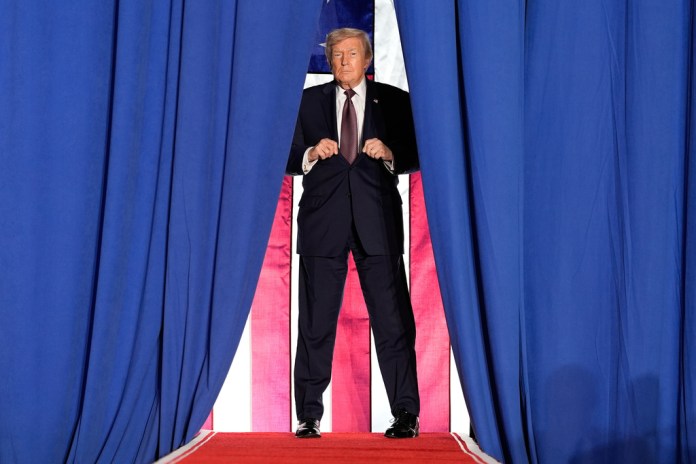If GOP Doesn’t Focus On The Economy, They’ll Lose Midterms Too
The article discusses the results and lessons of the recent November off-year elections, emphasizing that economic concerns remain the top priority for voters. Similar to previous elections, voters largely overlooked partisan attacks, focusing instead on issues that directly affect thier financial well-being. Exit polls from states like Virginia, New Jersey, and New York City showed that the economy and taxes dominated voter concerns, even influencing some independent voters to support Democrats who highlighted pocketbook matters.
The piece warns Republicans against underestimating the appeal of candidates with radical views, drawing a parallel with British politics and Jeremy Corbyn’s near-success despite his controversial socialist stance. Corbyn’s unexpected popularity was partly due to his opponent’s lack of vision and uncharismatic leadership-a cautionary note for Republicans hoping to capitalize on similar dynamics.
The article also criticizes former President Trump’s recent interview statements minimizing inflation, arguing that such dismissive attitudes fail to resonate with struggling families and provide ammunition for Democratic campaigns. Conversely, it highlights a more pragmatic approach from the current vice president, who focuses on achievable economic improvements.
To avoid future electoral losses, Republicans are urged to both enact a coherent agenda and effectively communicate their accomplishments and plans to the public. Without clear, tangible progress and voter outreach in the next year, the party risks further setbacks in upcoming elections.
Same song, second verse.
Those four words describe November’s off-year elections in a nutshell. Just as voters disregarded attacks against Donald Trump last year to vote for someone they thought would improve the economy, so too did the electorate shrug off concerns about Democrats in the face of what many perceive as a stagnant economy. It reinforces prior warnings to Republicans in Washington that, if they fail to deliver more for voters on pocketbook issues, their time in power will be short-lived.
Ignoring Lawfare
Recall that 12 months ago, Democrats focused much of their campaign on attacking Donald Trump: He was a “convicted felon,” a “threat to democracy,” and on and on. In all of the swing states, those attacks fell short. Voters didn’t much care about Democrats focusing on Trump’s perceived problems, in part because they recalled the excellent pre-Covid economy in Trump’s first term and viewed him as the better candidate to solve their problems.
Fast forward one year, and the dynamic has flipped. Exit polls, for whatever they’re worth, demonstrated that in Virginia, New Jersey, and New York City, the economy, along with (property) taxes in New Jersey, dominated voters’ concerns. And while all three jurisdictions tilt leftward to greater or lesser degrees, Democrat candidates such as Abigail Spanberger in Virginia and Mikie Sherrill in New Jersey also won independent voters after focusing on pocketbook issues.
One look at the exit polling data from New York City highlights this phenomenon. Say all you want about Zohran Mamdani’s radical positions when it comes to antisemitism, socialism, and just about everything else. The majority of New York City voters are so focused on cost-of-living issues that they just didn’t care:
Trans-Atlantic History Lesson
To those who think Mamdani’s election presents a golden political opportunity for Republicans, a word of caution is in order. Actually, two words, in the form of a recent British history lesson: Jeremy Corbyn.
Corbyn, elected to lead the Labour Party in the wake of their 2015 election defeat, had all of Mamdani’s vices and none of his (perceived) virtues. An unreformed Trotskyite who supported unilateral disarmament against the Soviet Union in the 1980s, Corbyn’s decades-long history meant he couldn’t attempt to disguise his radical statements as mere youthful indiscretions. And whereas Mamdani’s youthful looks and charisma hark back to the infamous “Hey Girl, It’s Paul Ryan” meme, Corbyn’s frumpy, dumpy appearance made him look more like a reincarnation of Leonid Brezhnev.
Yet Corbyn almost became prime minister. In the 2017 general election, Corbyn and the Labour Party picked up 30 seats in Parliament and won a greater share of the popular vote than Tony Blair did in his final election as prime minister.
Why did an unreformed socialist, whom 80 percent of his party’s MPs voted to kick out of his leadership post, almost win a general election? Because Theresa May, the prime minister who called the surprise “snap” election, had no enthusiasm for campaigning, no coherent platform, and no vision. And because Corbyn’s focus on “free stuff,” while economically unrealistic, proved appealing, particularly against an uncharismatic incumbent with no plan of her own. Republicans hoping to feast on Mamdani’s radicalism should beware the pitfall of walking into the same trap.
Can Republicans Relate?
Into that environment came President Trump’s interview with 60 Minutes, which sounded more than a little tone-deaf to the concerns voters expressed at the polls days later. Take, for instance, this exchange on the economy:
NORAH O’DONNELL: Can you just answer that question that tariffs have led to inflation? They have led to an increase in cost of living for most Americans—
PRESIDENT TRUMP: They haven’t led to inflation. We have no inflation. We have no inflation. Biden had inflation, and he didn’t have tariffs. He didn’t use tariffs.
At other points, the president repeated this message: “You know what, inflation I’ve already taken care of;” “It’s at 2 percent. It’s — it’s the perfect inflation;” “We don’t have any inflation;” “And I have no inflation;” “We — we don’t have inflation. You know, essentially we don’t have inflation.”
As painful as it sounds, the clips from that one interview gave Democrat ad-makers enough ammunition for the entire midterm election campaign. Because telling a struggling family who have been busting their tails for years to overcome Biden-era price hikes that “essentially we don’t have inflation” will work about as well as the left’s claims last year that Biden suffered no physical or mental declines while in office. Which is to say not at all.
Enact an Agenda — and Sell It
The morning after the election, the vice president had a much more practical and compassionate take on the economy, noting:
We need to focus on the home front. The president has done a lot that has already paid off in lower interest rates and lower inflation, but we inherited a disaster from Joe Biden and Rome wasn’t built in a day. We’re going to keep on working to make a decent life affordable in this country, and that’s the metric by which we’ll ultimately be judged in 2026 and beyond.
That means Republicans need to 1) pass an agenda and 2) make it tangible, including by communicating their accomplishments to voters. After all, if the Republican Congress spent so much time and energy passing their “big, beautiful bill” earlier this year, would it be too much to ask them, not to mention the president, to spend the same amount of time selling it to the public? More to the point, do Republicans even have an agenda beyond the bill they already passed, to give voters a sense of what more they would accomplish if returned to office next November?
With one year in this Congress down, time’s a wastin’. If Republicans don’t achieve those two objectives over the next 12 months, they will face another electoral reckoning next fall — with more to come after that — and deservedly so.
Chris Jacobs is founder and CEO of Juniper Research Group and author of the book “The Case Against Single Payer.” He is on Twitter: @chrisjacobsHC.
" Conservative News Daily does not always share or support the views and opinions expressed here; they are just those of the writer."




